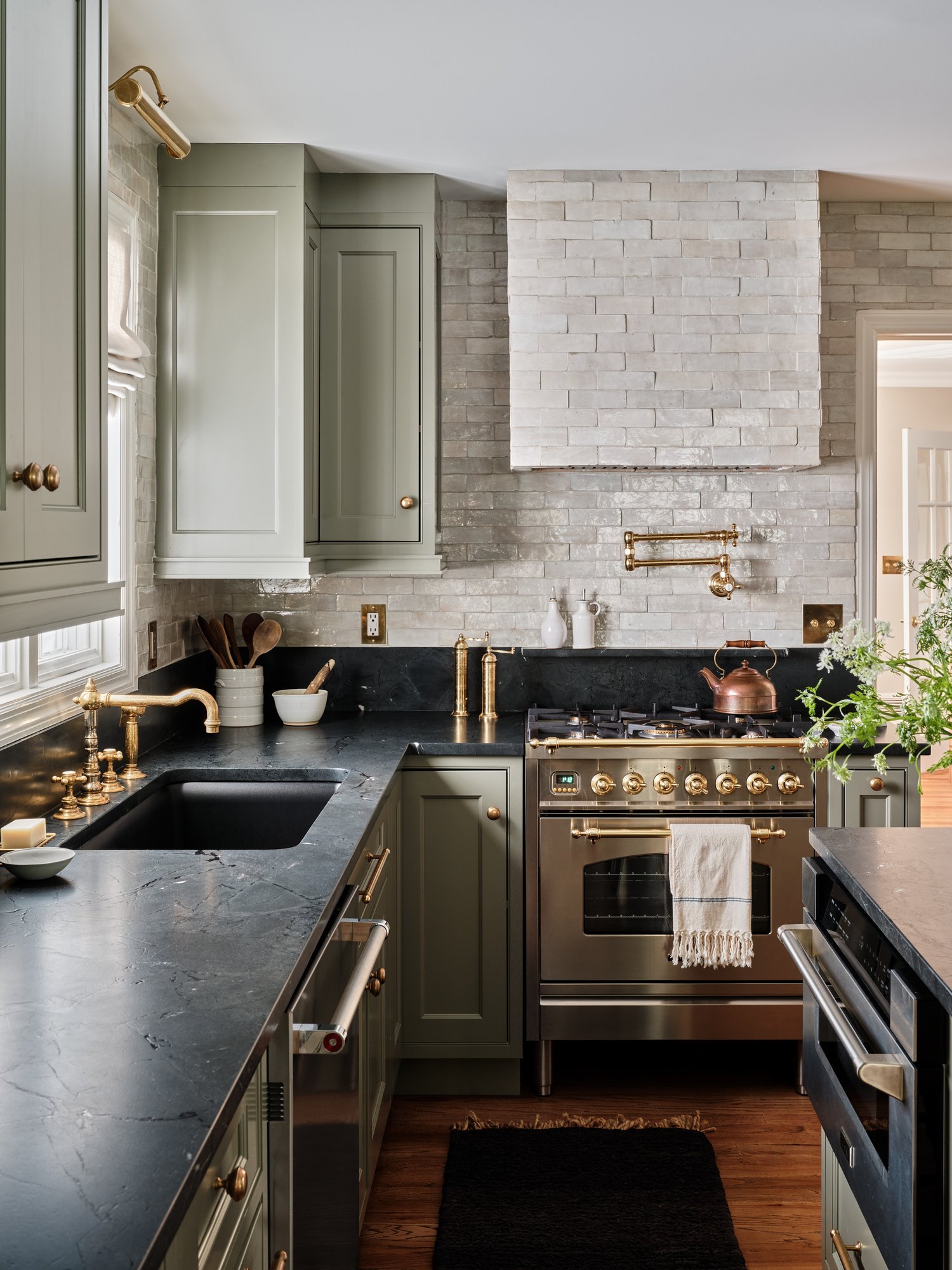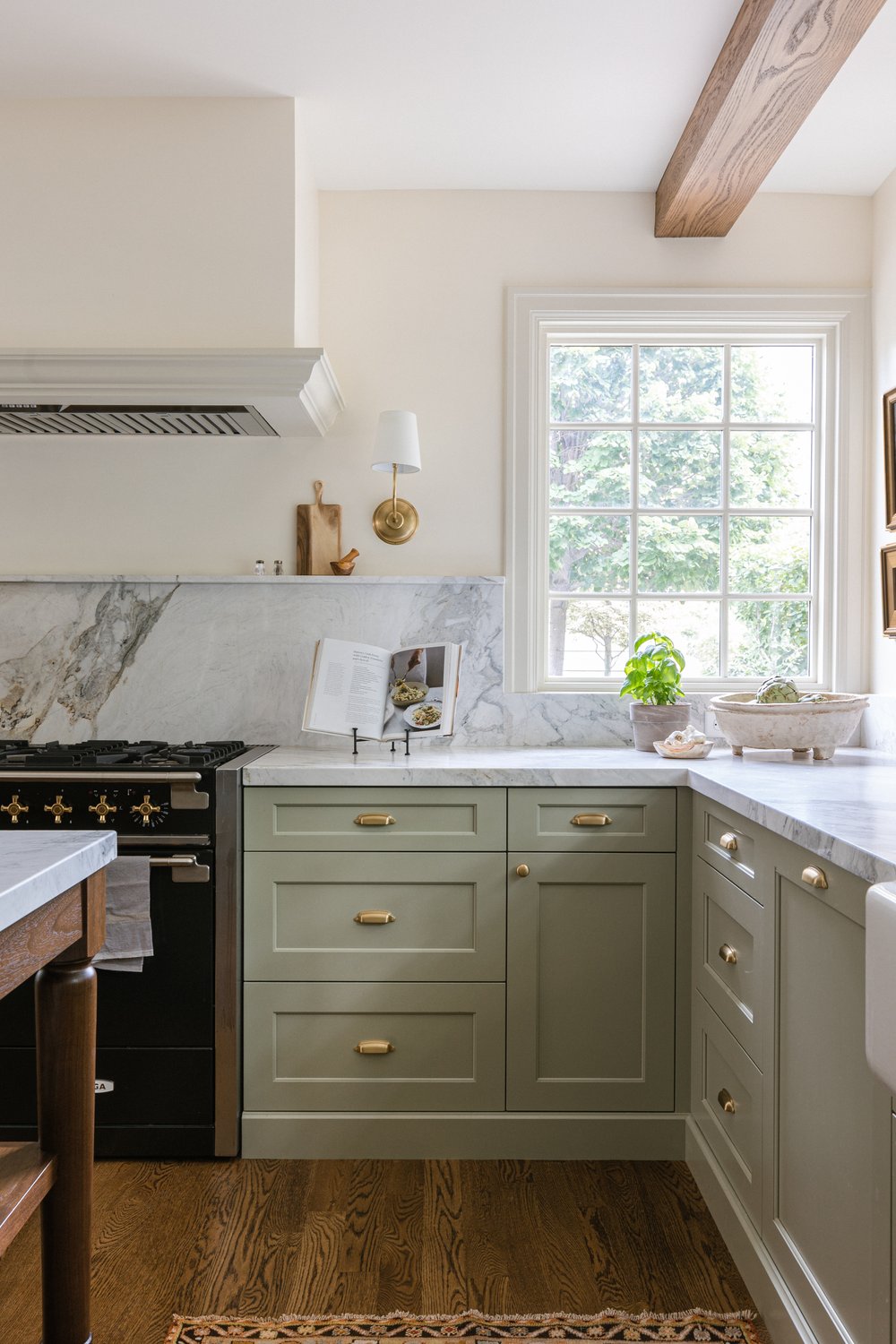
Countertop Specs: Negresco Leather Quartzite from ABC Stone
Most people have heard of quartz countertops, so when they hear the name quartzite, they assume it’s the same product. But in fact, they are very different. Even professionals mislabel quartzite countertops. Quartz is a man-made stone while quartzite is a 100% natural stone, pulled straight from the earth. We’ve already discussed the pros and cons of quartz counters here, so today let’s dive into quartzite and what makes it so special. We’re going to discuss the pros, cons, and care needs of quartzite countertops.

Countertop Specs: Polished Ocean Blue Quartzite

Stylist: The Primary Essentials | Photography: Kyle J Caldwell
Countertop Specs: Negresco Leather Quartzite from ABC Stone
Use Natural Stone is a great resource for learning more about natural stones. Some of the information in this article is provided by stone expert Karin Kirk.
Quartzite Countertop FAQ & Care Guide
100% NATURAL: Quartzite is a natural stone. It is made up entirely of the mineral quartz. Unfortunately, quartzite is often mislabeled and many slabs that are labeled as quartzite are in fact marble or dolomitic marble. There are key differences that distinguish quartzite from other stones. See below.
HOW TO TELL IF A COUNTERTOP IS REAL QUARTZITE: Karin Kirk of Use Natural Stone shares three easy ways to tell if a stone is quartzite or not.
- Grab a glass tile and place it on a flat surface. Then grab a sample or small remnant of quartzite and locate a rough section or pointy edge. Pressing hard, scratch the glass tile with the stone remnant. Did it leave a scratch or is it a powdered trail? Real quartzite will scratch glass easily. “Non-quartzite will either leave no scratch or a very faint scratch,” says Kirk. If the remnant feels slippery against the glass, doesn’t make a noise, and leaves a powdery trail that rubs off, it is not quartzite.
- If you don’t have a quartzite remnant to perform the test, but rather a full stone slab, you can do the knife blade test. “Try to scratch the rock with the tip of the blade. Genuine quartzite will be scratched lightly or not at all. Marble or dolomitic marble will be easily scratched.” -Kirk
- A third way to test if the quartzite is real is to try to etch it. Place vinegar or lemon juice on the stone’s surface and leave it for 15 minutes, then wipe it off. If the surface is lighter, darker, or duller, it is not quartzite. “Marble will show obvious etching. Dolomitic marble will show more subtle etching. Quartzite will have zero etching.”
HEAT RESISTANCE: Quartzite is highly heat resistant. While quartzite can withstand high temperatures, it is still recommended to use trivets for hot pots and pans.
STAINS: Quartzite ranges in porosity, with some slabs being more porous than others. The more porous the stone, the more likely it will absorb liquids that can result in stains. To prevent stains, an impregnating sealer is recommended.
SEALING: An impregnating sealer is necessary to protect quartzite against stains. The frequency in which you need to reapply the sealer depends on the sealant’s guidelines, as they can last anywhere from 1-10 years. Generally, annual sealing is recommended. A good way to test if your quartzite needs to be resealed is by looking near the kitchen sink. If the stone looks darker near the sink, that’s a good indicator that it needs to be resealed.
ETCHING: While some claim that quartzite can etch, that is not true. Quartzite will not etch from acids like lemon juice or vinegar. If the stone does etch, it’s been mislabeled and is most likely marble or dolomitic marble.
SCRATCHES & CHIPS: Quartzite is considered one of the hardest natural stones and is scratch-resistant. According to the Mohs Hardness Scale, quartzite is harder than glass and a knife blade. In fact, it’s recommended to use a cutting board not because quartzite might scratch, but because the knife may become dull. You may see the term “soft quartzite” floating around, but keep in mind that there is no such thing as soft quartzite. Kirk says that anything labeled as such is most likely marble.
CLEANING: Mild soap and water is recommended to clean quartzite countertops. Avoid abrasive cleaners as they can affect the sealer.

Soapstone Countertop Pros & Cons

Marble Countertop Pros & Cons

Granite Countertop Pros & Cons

Quartz Countertop Pros & Cons
Where behind the scenes, exclusive advice, and candid conversations are sent straight to your inbox every week.


